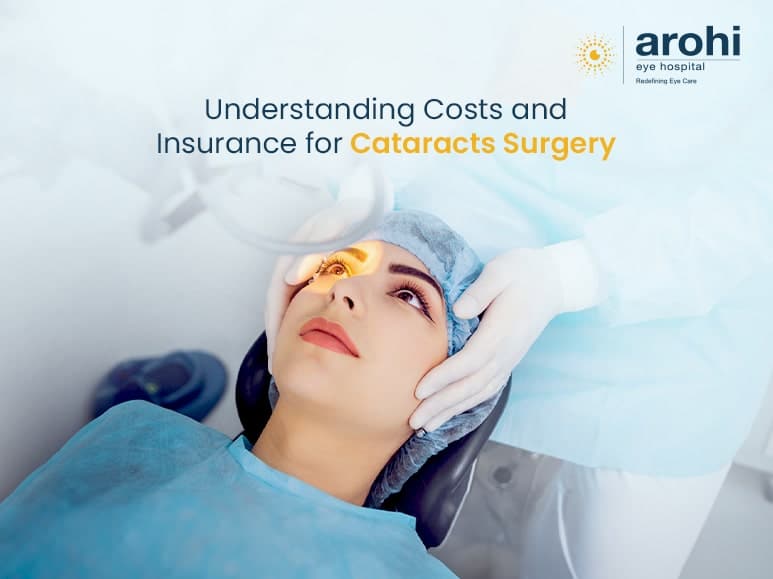Article Reviewed By: Dr. Shradha Goel
Table of Contents
Understanding Cataract Surgery
The cost involved in Cataract Surgery
Insurance Coverage for Cataract Surgery:
Additional Financial Considerations:
Get the Best Eye Care from Arohi Eye Hospital:
There are people who suffer because of cataracts, and most of them even lose their eyesight. It has been a vision stealer ever since, and many people simply lose their eyesight as they fear the cost of surgery might be just too high.
Cataract surgery is a crucial procedure for restoring vision to those affected by cataracts, a common condition where the lens of the eye becomes clouded. This surgery not only enhances quality of life but is also remarkably successful in improving sight. However, the financial aspect of it can be a significant concern for many. The costs of surgery can vary widely depending on factors like location, the technology used, and whether or not you have health insurance.
In this blog, we’ll dive into the various costs associated with cataract surgery and explore how insurance can play a pivotal role in managing these expenses.
Understanding Cataract Surgery
Cataract surgery removes the lens of your eye when it becomes cloudy, usually due to aging. This cloudiness impairs your vision, making daily activities like reading, driving, or seeing details difficult. Surgeons perform this surgery to restore clear vision and improve quality of life.
The most common procedure for cataract surgery is phacoemulsification. In this procedure, the surgeon makes a small incision in the eyes and inserts a tiny probe. This probe emits ultrasound waves that soften and break up the cloudy lens into small pieces. The fragments are then suctioned out. After removing the cloudy lens, the surgeon usually implants an artificial lens called an intraocular lens (IOL), which helps to restore vision. This lens is permanent and can often correct other vision issues as well.
Various technologies enhance the precision and safety of cataract surgery. For example, Laser-assisted surgery is another popular method. This technique uses lasers to make incisions and soften the lens, which can provide more accuracy than manual methods. Each technique and technology used aims to maximize patient comfort and surgical outcomes. For exceptional care and comfort, you can get the best eye surgeon in Mumbai to perform cataract surgery.
The cost involved in Cataract Surgery
Cataract surgery costs can vary widely, depending on several factors. Typically, the surgery costs between ₹20,000 and ₹1,00,000 per eye. Key factors influencing this cost include:
- Type of surgery: Traditional cataract surgery is usually less expensive than laser-assisted surgery, which can add ₹20,000 to ₹40,000 per eye.
- Technology used: The type of intraocular lens (IOL) implanted affects the price. Standard monofocal lenses are cheaper, while premium lenses like multifocal or toric lenses for astigmatism can increase costs by ₹30,000 to ₹70,000 per eye.
- Facility: Surgery performed in a hospital might be more expensive than in an outpatient surgical center.
Other factors include the experience and location of the surgeon, as well as whether insurance covers the procedure. Insurance plans may cover basic cataract treatment but might not include premium lenses or additional costs associated with advanced surgical techniques.
Insurance Coverage for Cataract Surgery:
Insurance typically pays for cataract surgery, but the extent of coverage can vary. Generally, health insurance plans cover the basic costs of cataract surgery, including pre-surgery exams, the surgery itself, and the implantation of a standard intraocular lens (IOL).
However, patients may have to cover certain expenses out of pocket. Insurance often does not cover premium lenses, such as multifocal or toric lenses for astigmatism, which can cost significantly more. Additionally, opting for advanced surgical techniques like laser-assisted surgery may result in extra charges.
To check what your specific insurance plan covers, review your policy documents or contact your insurance provider directly. Ask about coverage details, including the types of lenses and surgical techniques included, and inquire about any out-of-pocket expenses. If you are planning to get a cataract operation in Mumbai, it’s also helpful to consult with your surgeon’s office, as they often assist with insurance queries and can provide cost estimates based on your coverage.
Additional Financial Considerations:
When planning for surgery, consider that there may be hidden costs. These can include post-surgery medications, special lenses, or follow-up visits that the initial estimate does not cover.
Here’s how to manage medical expenses effectively:
- Set aside extra funds: Start by allocating a budget for unexpected healthcare costs for your treatment for cataracts.
- Check insurance coverage: Contact your insurance provider to understand what is and isn’t covered.
- Request cost breakdown: Ask your doctor or hospital for an itemized list of potential charges.
- Explore payment plans: If some costs aren’t covered, discuss setting up a payment plan with your healthcare provider.
Stay prepared: Being well-prepared can help you avoid financial surprises related to healthcare.
Get the Best Eye Care from Arohi Eye Hospital:
When preparing to get rid of cataracts, it’s important to understand healthcare costs and insurance coverage. Regularly consulting with your healthcare provider and insurance company ensures you are well-prepared for any medical expenses. Knowing what your insurance covers can save you stress and money.
Arohi Eye Hospital stands out for its exceptional patient care and cutting-edge facilities. Our highly skilled ophthalmologists use state-of-the-art technology to specialize in a wide range of eye treatments, including advanced cataract surgery. We prioritize educating our patients making sure they fully understand their procedures and associated costs. By committing to transparency and providing support throughout the cataract treatment process, we ensure that patients trust us for their eye care needs.

